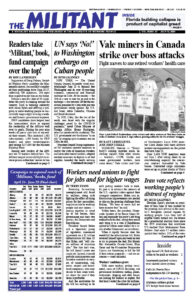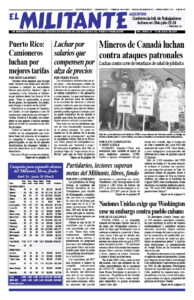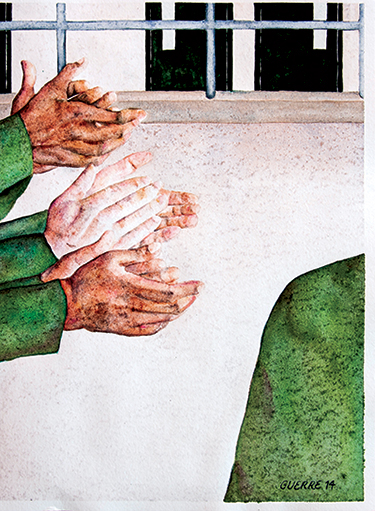
One of Pathfinder’s Books of the Month for July is the French edition of Voices from Prison: The Cuban Five. Fernando González, René González, Antonio Guerrero, Gerardo Hernández and Ramón Labañino were arrested on frame-up conspiracy charges by the FBI in 1998 and given draconian sentences. They were monitoring the plans of Cuban American paramilitary outfits in Florida with a long record of armed attacks on Cuba from U.S. soil. The Five were freed under the pressure of growing protests worldwide — a “jury of millions” — with Hernández, Labañino and Guerrero the last to return to Cuba in 2014. The excerpts are from a 2013 interview with René González by the Cuban weekly Escambray. Copyright © 2014 by Pathfinder Press. Reprinted by permission.
In the United States, “arrest” is a euphemism for assault. They storm your home in a show of force to paralyze you; that’s the first step to try to soften you up. The federal police started beating on the door; in other cases they used a battering ram. We lived down a very narrow hall and the door was made of iron. It seems they couldn’t physically knock it down. They banged on it violently and when I opened, they entered with pistols drawn. They shoved it open, threw me to the floor as they threatened me with the pistol, and immediately cuffed me.
When Olguita came out of the bedroom they threw her against the wall. Then they stood me up, asked me if I was René González, if I belonged to Brothers to the Rescue. That Saturday they took me away to prison.
Escambray: How would you describe the first days in prison?
González: The first days are terrible. Besides, our case was different from the common practice in which they take you to a receiving area, give you clothing, explain how the prison works and let you make a phone call.
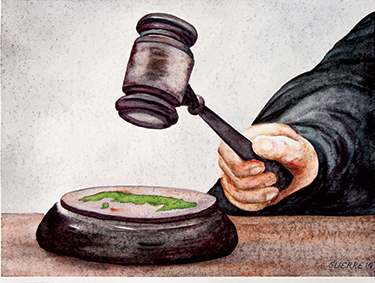
We were given special treatment; in military terms they call it “shock and awe” — they violently arrest you and take you to the FBI to see whether or not you’re the kind of person who will plead guilty, who will cooperate. They immediately put you in the “hole,” alone, to make you start thinking about what lies ahead for you. Those are days when you can’t sleep; they didn’t even give us a sheet, nothing.
At that moment the die is cast. If you didn’t decide to capitulate then, you weren’t going to do it later. From that point on we decided we were not going to give in, and that was that. That’s what I had to confront.
Those were difficult days, right up to Monday. It was all well-staged. They keep you alone with your thoughts on Saturday and Sunday, without shaving or brushing your teeth. On Monday they dress you up like a clown and take you down to the courtroom. They make you walk down an aisle and there’s this mob of people, full of hatred, looking at you shackled, unkempt, with a cadaverous look, and at the same time you’re worrying about your family.
I was lucky. When they brought me out of the elevator and made me face that room full of people, and I was looking for my family, I suddenly heard a shout: “Daddy!!!” I looked around and saw Irmita giving me a big thumbs-up. From that moment on I took a deep breath and told myself: this breath will last me until this is over, and it’s still with me.
Escambray: What did you hold onto, to keep from selling out, as some other members of the Cuban network did?
González: Basically, human dignity; I believe in the value of dignity. The trial showed there are some who don’t believe in it, but human values do exist. We all assert them, but under conditions like those, you see who believes in them and who doesn’t. The Five believed in them. If human values exist, I don’t see why a human being must give in to brute force — political convictions aside.
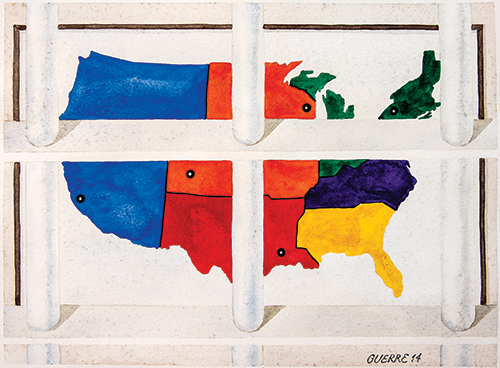
Just because these people have the power to mistreat me, to lock me up, I’m going to give in? No one taught me there is any value to that. In addition, there’s the mission you were carrying out, the understanding of your cause, your awareness of what you were doing — knowing you are right, knowing you were defending human lives, knowing you are being tried unjustly.
All this adds up. And on top of that is the way they act. You see them lying to the judge, blackmailing witnesses, deceiving the court, defying the judge’s orders, lying to the jury, coaching people to lie. As you see the depths to which they will go, you say: just how low can they get? At that point you tell yourself: I can’t give in to these people.
Escambray: You were locked up in Pennsylvania, South Carolina and Florida. How do you win respect in such a hostile environment?
González: In the case of the US prison system, just going to trial earns you a lot of respect — almost no one goes to trial. People are afraid to go to trial; the system is rigged in such a way that in a trial you will lose. Your lawyers will talk you out of it and persuade you to cooperate with the prosecutor, and cooperating always ends up meaning you have to finger somebody. What’s involved? When you went to trial, you stood up to the government.
People respect you a lot for that. Besides, they know you won’t finger them.
